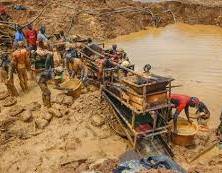Illegal gold mining (galamsey) continues to be a threat to forest and water resources in Ghana. Even though galamsey is not new in Ghana, the use of heavy machines such as excavators, bulldozers, and chanfans is a recent phenomenon causing destruction to forests, farmlands, and river bodies. Illegal mining undermines the government’s commitment to the attainment of the 17 sustainable development goals.
Governments since 1989 have made attempts to clamp down on illegal mining using military interventions. Unfortunately, these programmes have failed to yield any results. Concerns about the destruction of the natural environment and the impacts of climate change have heightened the fear of illegal gold mining in Ghana. This paper, therefore, analyses the failure of government and military interventions aimed at fighting illegal gold mining in Ghana since 1989. To achieve the objective of the study, a qualitative research approach was used. A total of 26 individuals were interviewed. Exploratory and descriptive research designs were employed for the study. As part of data management, collected data from fieldwork was cleaned and edited for spelling mistakes and inconsistencies before entries were made for analysis. The data analysis was carried out manually. Finally, the study found that the failure of government interventions since 1989 is a result of a lack of proper planning of programmes aimed at dealing with illegal gold mining and poor collaboration between the government and chiefs and stakeholders. The paper contributes to the discussion on illegal mining in Ghana and its impact on the environment and sustainable development.
Understanding local communities' willingness to participate in environmental restoration activities can help assess the level of volunteerism that can be expected for restoration projects. This study ascertained local communities’ perceptions of the importance of non-market ecosystem services, the impact of illegal mining on ecosystem services, and their willingness to participate in the restoration of degraded lands resulting from illegal mining. Fifty respondents each were purposefully selected from three mining communities (Ntakam, Asawinso No. 1, and Nkatieso) in a survey. Analysis of variance (ANOVA) test results indicated there was no difference in views of respondents regarding the importance of forests for various non-market services. Illegal mining activities were identified as the cause of environmental problems such as water pollution, deforestation, poor soil fertility, and limited access to land for agricultural productivity. The majority of respondents across the three communities indicated that forests are very important for non-market environmental services. Logistic regression results indicated that factors that affect likeliness to participate in restoration financing include income, embracing non-market ecosystem services as important, confidence in PES schemes, and positive value motivation for restoration (altruistic, use, and bequest values).
activit




No comments yet
Be the first to share your thoughts!